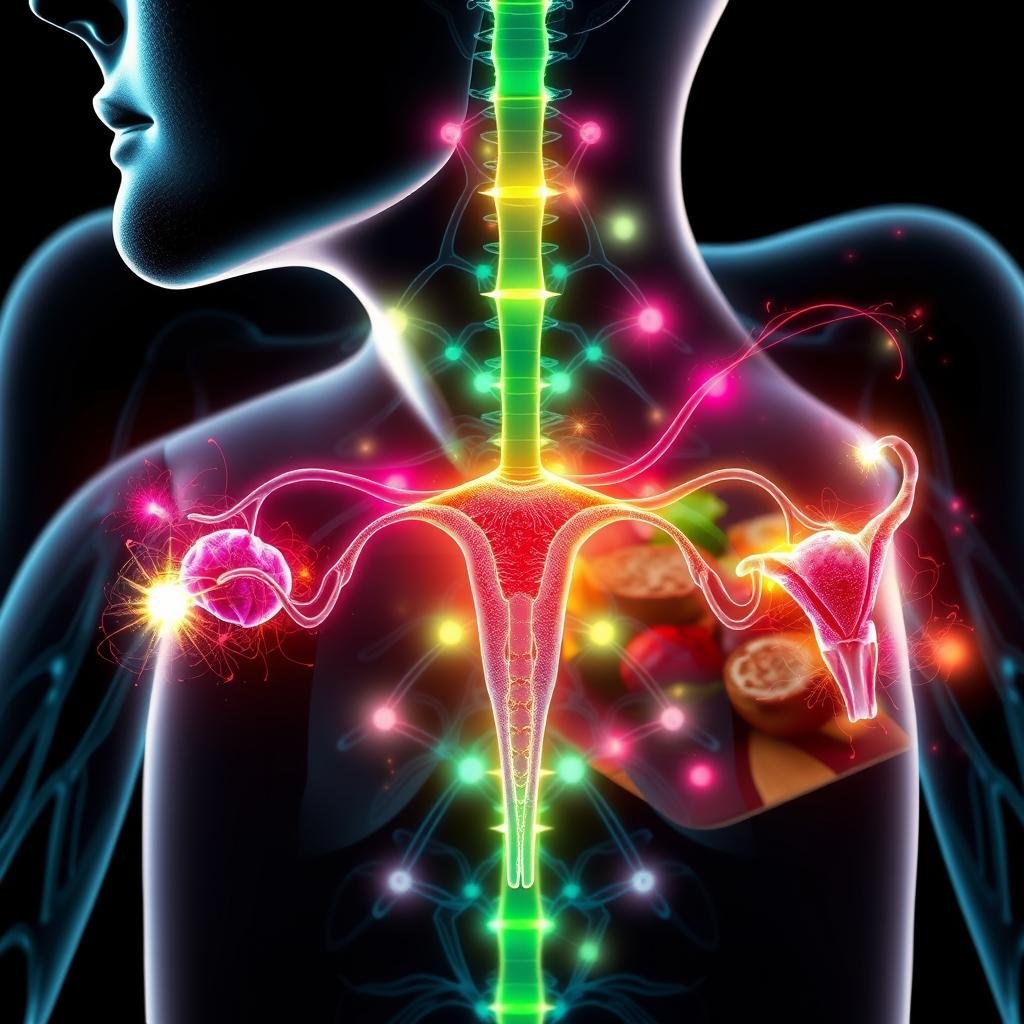Did you know a banana has about 20 grams of net carbs? That’s 40% of the daily carb limit on keto. This shows why women might lose weight slower on keto. The diet can be great for weight loss, but women need a special approach.
The ketogenic diet is known for burning fat and improving health. But many women find their weight loss slower than they hoped. This article looks at seven reasons why women lose weight slower on keto. It also offers practical solutions to help you overcome these challenges.
Women face unique challenges on the keto diet due to hormonal and metabolic differences. We’ll explore how these factors affect fat loss. You’ll learn how to adjust the diet to fit your needs. Whether you’re new to keto or stuck in a plateau, this guide will help you succeed.
Understanding Female Biology and Ketogenic Metabolism
The keto diet affects women differently because of their unique biology. Female metabolism and keto interactions bring special challenges to weight loss. Let’s look at the main differences in hormones, fat storage, and metabolic rates that affect keto metabolism in women.
Hormonal Differences Between Men and Women
Women’s hormonal changes are key in their keto journey. Estrogen and progesterone levels change during the menstrual cycle. These changes affect how fat is stored and energy is used. This can make ketosis and weight loss harder for women.
Female Fat Storage Patterns
Women tend to store fat in specific areas due to evolution. This fat storage, influenced by estrogen, makes losing weight on keto harder. Knowing these patterns helps tackle the hormonal impact on keto for women.
| Factor | Impact on Keto for Women |
|---|---|
| Estrogen Levels | Affects fat storage and metabolism |
| Menstrual Cycle | Influences ketosis and weight loss |
| Fat Distribution | Makes targeted fat loss more difficult |
Metabolic Rate Variations
Women generally have less muscle and a slower metabolism than men. This affects how well keto works for them. Adjusting keto plans to fit these differences can help improve weight loss.
studies found that the ketogenic diet increases certain bile acids in mice, which can lead to less body weight. But these results might not apply to women’s biology. This shows the need for more research on keto metabolism in females.
Why Women Lose Weight Slower on Keto
Women often face unique challenges when following a keto diet. Understanding these hurdles can help you tailor your approach and achieve better results. Let’s explore the key factors that contribute to slower weight loss for women on keto.
Estrogen’s Impact on Fat Distribution
Estrogen plays a big role in how women store fat. This hormone helps store fat in the hips, thighs, and breasts. On keto, women may find it harder to lose fat from these areas due to estrogen’s influence.

Menstrual Cycle Effects on Ketosis
The menstrual cycle and keto have a complex relationship. Hormonal changes can impact ketosis and weight loss. During certain phases, you might experience increased cravings and reduced insulin sensitivity, making it harder to stay in ketosis.
Adjusting your keto macros based on your menstrual cycle can optimize your weight loss journey.
Insulin Sensitivity Differences
Keto diet gender differences extend to insulin sensitivity. Women typically have lower insulin sensitivity compared to men, which can affect fat burning and weight loss on a keto diet. This difference partly explains why women struggle with keto weight loss more than men.
| Factor | Impact on Women’s Weight Loss |
|---|---|
| Estrogen | Promotes fat storage in specific areas |
| Menstrual Cycle | Causes hormonal fluctuations affecting ketosis |
| Insulin Sensitivity | Lower sensitivity slows fat burning |
By understanding these factors, you can adapt your keto approach to overcome obstacles and achieve your weight loss goals. Remember, patience and consistency are key when navigating the keto journey as a woman.
The Role of Female Hormones in Ketogenic Success
Female hormones are key in how well you do on a keto diet. Knowing how they work can help you get the most out of keto. Hormones like estrogen, progesterone, and testosterone affect how your body uses fat and energy.
Women often face changes in how their body reacts to keto due to hormones. Your menstrual cycle can change how you feel and lose weight. For example, when you lose weight on keto, your estrogen levels go down. Studies show that women losing about 17 pounds see a 5.7% drop in estrone and a 10% decrease in estradiol.
There are ways to tailor keto to fit your body’s natural cycles. You might need to adjust what you eat or how much you exercise based on your hormones. This can help you lose weight more steadily and keep it off.
| Hormone | Impact on Keto | Strategy |
|---|---|---|
| Estrogen | Affects fat distribution | Monitor fiber intake |
| Cortisol | May hinder weight loss | Stress management techniques |
| Thyroid hormones | Influence metabolism | Regular thyroid panel tests |
| Insulin | Affects fat storage | Maintain ketosis for improved sensitivity |
Keto can also affect your hormones and menstrual cycle. Women with PCOS might see better hormone balance and fertility on keto. To get the best results, think about getting lab tests before starting keto to check your hormone levels.
Discover more solutions in our PCOS keto article and get support with essential vitamins.
Common Metabolic Challenges for Women on Keto
Females on ketogenic diets often face unique metabolic hurdles. Understanding these challenges can help you navigate your weight loss journey more effectively.
Thyroid Function and Adaptation
The keto diet can impact thyroid function, which plays a key role in metabolism. Some women may see a drop in T3 hormone production, which can slow weight loss. To support thyroid health, ensure adequate iodine intake and monitor your symptoms closely.
Cortisol and Stress Response
High stress levels increase cortisol production, promoting fat storage, which can hinder weight loss on keto. Practice stress-reduction techniques like meditation or yoga to keep cortisol in check.
Blood Sugar Regulation
Women may face blood sugar fluctuations on keto, which can affect ketosis and slow weight loss. Track your macros carefully, aiming for less than 50 grams of carbs daily to maintain ketosis.
| Challenge | Impact | Solution |
|---|---|---|
| Thyroid Issues | Slower metabolism | Monitor iodine intake |
| High Cortisol | Increased fat storage | Stress management |
| Blood Sugar Swings | Disrupted ketosis | Strict macro tracking |
Remember, the keto diet and weight loss for women can be complex. By addressing these common metabolic challenges, you’ll be better equipped to overcome obstacles and achieve your health goals.
Essential Nutritional Adjustments for Female Keto Success
Adjusting keto for women means paying close attention to nutritional needs. By optimizing keto for weight loss in women, you can get better results and stay healthy.
Proper Macronutrient Ratios
For keto weight loss for women, the right macronutrient ratios are key. Aim for 5-10% of calories from carbs (20-50 grams daily). Also, get 55-60% of calories from fats and keep protein intake moderate, not over 35% of total calories. This balance helps you stay in ketosis and avoid gluconeogenesis.

Caloric Requirements
Women often eat too little on keto, which can stop weight loss. It’s important to track your calories to ensure a slight deficit. Remember, even in ketosis, eating too much can stop fat loss. Adjust your intake based on how active you are and your menstrual cycle phases.
Micronutrient Considerations
Don’t forget about essential micronutrients when optimizing keto for weight loss in women. Focus on iron, magnesium, and B vitamins. If needed, consider supplements, like during menopause when hormonal changes affect nutrient absorption.
- Stay hydrated and maintain electrolyte balance to avoid fatigue and cravings
- Include complex carbs from vegetables and leafy greens for fiber and nutrients
- Avoid hidden carbs in nuts, dairy, and sugar alcohols that can hinder ketosis
By making these nutritional adjustments, you’ll be better equipped for successful keto weight loss for women. Always consult with a healthcare professional, even more so if you have health issues or are taking medications that could affect your weight loss journey.
Exercise Strategies to Enhance Female Keto Results
Women can get better results on keto by choosing the right exercises. Low-intensity activities like jogging, biking, and yoga are great. They help improve endurance and fat burning, matching the diet’s effects.

Strength training is key for women on keto. It keeps muscle mass, boosts metabolism, and helps manage weight. This exercise also prevents muscle tone loss and osteoporosis, keeping you healthy long-term.
Here are some tips for exercising on keto:
- Start with low-intensity, steady-state activities to maximize keto benefits
- Gradually incorporate strength training to boost metabolism
- Be patient during the initial adaptation phase when energy levels may dip
- Focus on consistency, as keto can speed up muscle recovery
Exercise does more than help with weight loss. It also improves mood, sleep, and overall health. By pairing the right exercises with your keto diet, you’ll see better results and feel great.
Stress Management and Sleep Optimization
Managing stress and improving sleep are key to overcoming keto challenges for women. These factors are essential for successful weight loss and overall health on the ketogenic diet.
Cortisol Control Techniques
High stress can slow down your keto progress. A study showed that 65% of women experienced better sleep after a month on keto. To improve slow weight loss, try stress-reducing activities like meditation, deep breathing, or yoga.
Sleep Quality Improvements
Good sleep is critical for women on keto. The diet can help with melatonin and serotonin production, leading to better sleep. Make sure to get enough magnesium, potassium, and calcium to avoid sleep problems.
Lifestyle Modifications
Understanding keto challenges often leads to lifestyle changes. Keep a gentle calorie deficit to avoid stress. Balance your macronutrients and watch your electrolyte levels to prevent muscle cramps. Remember, keto can help stabilize blood sugar, reducing stress and improving sleep, even for those with insulin resistance.
| Stress Management Technique | Sleep Optimization Strategy |
|---|---|
| Meditation | Consistent sleep schedule |
| Deep breathing exercises | Magnesium supplementation |
| Yoga practice | Reduced blue light exposure |
Breaking Through Weight Loss Plateaus
Hitting a weight loss plateau on keto can be frustrating for women. But don’t worry, there are effective strategies to get the scale moving again. Let’s explore some proven methods for overcoming keto weight loss plateaus for women and fixing slow weight loss on keto.
Intermittent Fasting Approaches
Intermittent fasting can be a powerful tool to fix slow weight loss on keto. The 16/8 method, where you fast for 16 hours and eat within an 8-hour window, can boost fat burning and metabolism. This approach can help break through plateaus by increasing your body’s fat-burning ability.
Carb Cycling Options
Carb cycling involves strategically varying your carb intake. While maintaining ketosis typically requires 20-50 grams of carbs daily, occasional higher-carb days can reset hormones and boost metabolism. This technique can be very effective for keto weight loss for women, helping to overcome plateaus without derailing long-term progress.
Activity Level Adjustments
As you lose weight, your metabolism may slow down, burning fewer calories daily. To counter this, consider increasing your activity levels. Incorporating strength training can build muscle mass, which enhances fat loss and metabolism. This adjustment is key in overcoming keto weight loss plateaus for women.
- Track your carb intake to identify hidden sources
- Monitor protein consumption to maintain ketosis
- Reduce added fats to encourage body fat utilization
- Limit alcohol and choose low-carb options
- Practice mindful eating to address emotional eating
By implementing these strategies, you can effectively break through weight loss plateaus and continue your keto journey with renewed progress. Remember, consistency and patience are key to long-term success in keto weight loss for women.
Tracking Progress Beyond the Scale
Looking beyond the scale is key when you’re on keto. Female-specific keto strategies often show results that aren’t just about weight loss. It’s important to track non-scale victories (NSVs) for women on keto.
Your body changes a lot when you start keto. Weight loss might slow down after a few weeks. But, this doesn’t mean you’re not doing well. Many women feel more energetic, happier, and healthier before they see big weight changes.
- Body measurements: Track inches lost with a tape measure
- Energy levels: Note improvements in daily stamina
- Skin health: Observe changes in complexion and clarity
- Sleep quality: Record changes in sleep patterns
- Clothing fit: Pay attention to how your clothes feel
Keto weight loss for women isn’t always straightforward. Hormones can make you retain water and cause weight plateaus. Focusing on NSVs keeps you motivated and shows your progress, even when the scale doesn’t change.
“Success on keto isn’t just about pounds lost, but also about how you feel and function in your daily life.”
Tracking body fat percentage and taking progress photos can help. These methods give a full picture of your keto journey. They can be great motivators when weight loss slows down.
Conclusion
The keto diet can help with weight loss, but it’s not for everyone. Women have special challenges because of their biology and hormones. By understanding these, you can make your diet work better for you.
Success on keto isn’t just about cutting carbs. Watch your protein intake, stay active, and manage stress. Don’t worry if you don’t lose weight fast. Weight loss on keto is slow, so focus on getting healthier overall.
Also, be careful of hormonal imbalances. Women might need to adjust their diet to keep their hormones and thyroid in check. Consider talking to a healthcare professional to make sure you’re getting the right nutrients. With patience and the right plan, you can beat the challenges and reach your weight loss goals on keto.
FAQ
Why do women typically lose weight slower on keto compared to men?
Women often lose weight slower on keto because of hormonal differences. They have less muscle mass and unique fat storage patterns. Estrogen levels, menstrual cycle changes, and insulin sensitivity also affect how women respond to keto.
How does the menstrual cycle affect ketosis and weight loss?
Hormonal changes during your menstrual cycle can affect ketosis and weight loss. You might feel hungrier, retain more water, and gain weight during the luteal phase. Adjusting your diet and exercise can help improve your keto results.
Can thyroid function be affected by a ketogenic diet?
Yes, a very low-carb diet can affect thyroid function in some women. It’s key to watch your thyroid health and eat enough iodine and selenium. If you notice thyroid problems, talk to a healthcare provider.
How can I adjust my macronutrient ratios for better results on keto?
Adjust your macronutrient ratios based on your needs, activity level, and menstrual cycle. You might need more protein for muscle or adjust carb intake during certain times.
What role does stress play in keto weight loss for women?
Stress can raise cortisol levels, making it harder to lose weight on keto. Try stress-reducing activities like meditation, yoga, or regular exercise to help control cortisol and support weight loss.
Is intermittent fasting effective for women on keto?
Intermittent fasting can help break through weight loss plateaus on keto. But women should start with short fasting windows and adjust as needed, considering their menstrual cycles.
How can I track progress beyond the scale on a keto diet?
Track non-scale victories like body measurements, energy levels, mood, skin, and inflammation. Keep a journal, take photos, and monitor how your clothes fit. Also, track body fat percentage and blood markers for a full health view.
What exercise strategies work best for women on keto?
Mix strength training with cardio for best results on keto. Strength training boosts metabolism, preserves muscle, and improves insulin sensitivity. Time your workouts around meals and fasting, and adjust protein intake for muscle growth and recovery.
How can I optimize my sleep while on a ketogenic diet?
Improve sleep quality by sticking to a schedule, creating a sleep-friendly environment, and managing blue light. The keto diet can affect sleep for some. If you have sleep issues, try adjusting meal timing or increasing carbs before bed.
Is carb cycling beneficial for women on keto?
Carb cycling can help overcome weight loss plateaus and reset hormones. It boosts metabolism and replenishes glycogen stores without derailing ketosis. But, do it carefully and choose the right foods to stay keto.

I’ve followed a low-carb and ketogenic lifestyle for over five years, gaining hands-on experience with what is practical, sustainable, and realistic in daily life. My work is informed by continuous self-education through reputable nutrition research and publicly available medical literature.
Read more about the founder →



